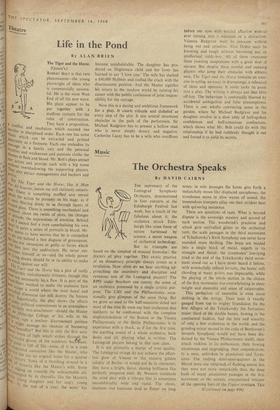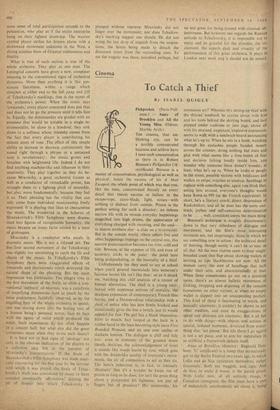Mus ic
The Orchestra Speaks
By DAVID CAIRNS THE supremacy of the Leningrad Symphony Orchestra, demonstrated in four concerts at the Edinburgh Festival last week, has a touch of the fabulous about it; the orchestra struck Edin- burgh like some force of nature harnessed by science, a secret weapon of orchestral technology.
But its triumphs are based on the simplest of musical formulas: the _players all play together. This exotic practice of an elementary principle always comes as a revelation. How often do we hear anything ap- , proaching the unanimity and discipline and ravenous zest of the Leningrad players? The RPO under Beecham can convey the sense of an orchestra possessed by a single artistic pur- pose. The LSO and the Philharmonia occa- sionally give glimpses of the same thing. But we grow so used to the half-measures doled out most of the time by even our best orchestras that suddenly to be confronted with the complete singlemindedness of the Boston or the Vienna Philharmonic or the Berlin Philharmonic is to experience with a shock, as if for the first time, the startling sound of a whole orchestra, back desks and all, playing what is written. The Leningrad players belong in this rare class.
It is not primarily a matter of tone quality. The Leningrad strings do not achieve the effort- less glow of Vienna or the massive golden solidity of Berlin—it would not be in character; they have a bright, fierce, shining brilliance like perfectly tempered steel. By Western standards the wind play with a vibrato that is sometimes uncomfortably wide and rapid. The oboes, clarinets and bassoons tend to flutter on long notes; in solo passages the horns give forth a melancholy moan like displaced saxophones, the trombones move in slow waves of sound, the tremendous trumpets splay out their strident beat with quivering insistence.
These are questions of taste. What is beyond dispute is the sovereign mastery and accord of each section. The woodwind's precision and attack give unrivalled glitter to the orchestral tutti; the scale passages in the third movement of Tchaikovsky's Sixth Symphony can never have sounded more thrilling. The brass are welded into a single block of metal, superb in its strength and thrust: the trombones' low-lying triad at the end of the Tchaikovsky third move- ment stood out as I have never heard it before, with wonderfully refined ferocity, the horns' soft chording at many points was impeccable, while the playing of the whole section in the climax of the first movement was overwhelming in sheer weight and ensemble and sense of catastrophe.
This perfection of ensemble is even more striking in the strings. Their tone is exactly gauged from top to mighty foundation (in the first Allegro of the Tchaikovsky the fortissimo major third of the double basses, bowing in the continental fashion, had the bite and sonority of only a few orchestras in the world, and the grinding minor second in the coda of Beethoven's Seventh Symphony would not have been dis- dained by the Vienna Philharmonic itself), their attack reckless in its enthusiasm, their bowing unanimous and ungrudging, their concentration, to a man, unbroken in pianissimo and fortis- simo. The rushing demi-semi-quavers in the March were one whip-lash of flashing sound, but they were not more remarkable than the deep hush of many pianissimo passages in the first movement or the minute, concentrated whisper of the opening bars of the Figaro overture. This (Continued on page 406) same sense of total participation extends to the percussion, who play as if the entire enterprise hung on their lightest drum-tap. The warrior cymbal player strikes his brazen plates with a downward movement unknown in the West, a slicing scimitar blow of Oriental ruthlessness and finality.
What is true of each section is true of the whole orchestra. They play as one man. The Leningrad concerts have given a new, completer meaning to the conventional signs of orchestral dynamics. More than anything it is this pas- sionate literalness, within a range which stretches at either end to the full pppp and tiff of Tchaikovsky's markings, that is the secret of the orchestra's power. When the music says 'crescendo,' every player concerned does just that and does not let go the pressure until it tells him to. Equally, the diminuendos are graded with an evenness that would be notable in a single in- strumentalist, let alone in a hundred; they sink down to a softness whose intensity comes from the fact that every player is contributing his minute atom of tone. The effect of this simple ability to increase or decrease continuously the sound right through a phrase or a sustained note is revolutionary : the music grows and breathes with heightened life. Indeed I do not find anything machine-like and inhuman in their unanimity. They play together as they do be- cause Mravinsky, a great orchestral trainer as well as a conductor of remarkable power, has wrought them to a fighting pitch of ensemble, but also, more fundamentally, because they feel it so. Their phrasing has the vitality that can only come from individual musicianship freely expressed. It is playing that likes to characterise the music. The woodwind in the Scherzo of Shostakovitch's Fifth Symphony were drama- tised into figures of recognisable 'humanity; the music became an ironic farce mimed by a team of grotesques.
Mravinsky is a conductor who excels in dramatic music. His is not a relaxed art. The five/four second movement of the Tchaikovsky was slightly too unrelenting to catch the lilt and charm of the music. In Tchaikovsky's Fifth Symphony there were exaggerated effects of crescendo and decrescendo which destroyed the natural shape of the phrasing. But the main impression was formidable. The allegro vivo in the first movement of the Sixth, so often a con- ventional 'outburst' of neurosis, was a cataclysm of stupefying dimensions (and as much by the tense pianissimos, faithfully observed, as by the engulfing fury of the whole orchestra in spate); one was' staring down into the boiling vats of a human being's personal terror, face to face with the agony of mind which produced the notes. Such experiences do not often happen in a concert hall; but what else did the great composers mean when they wrote such music?
It is hard not to find signs of 'ideology' not only in the obvious dedication of the players to a collective idea but in the heroism of Mravinsky's interpretations. If the finale of Shostakovitch's Fifth Symphony was made musi- cally convincing for the first time by the fervour with which it was played, the finale of Tchai- kovsky's Sixth was considered by many to have sounded unnaturally 'affirmative.' skirting the pit of despair into which Tchaikovsky is plunged without reprieve. Mravinsky did not linger over the movement; nor does Tchaikov- sky's marking suggest one should. He did not wring the last drop of anguish from the suspen- sions, the horns being made to detach the dissonant notes from the succeeding ones. To me the tragedy was there, ennobled perhaps, but no less great for being treated with classical ob- jectiveness. But however one regards the Russian attitude to Tchaikovsky, it is impossible not to enjoy and be grateful for the stimulus, the ex- citement, the superb dash and vivacity of the performance's of this great orchestra. It plays in London next week anci it should not be missed.



































 Previous page
Previous page